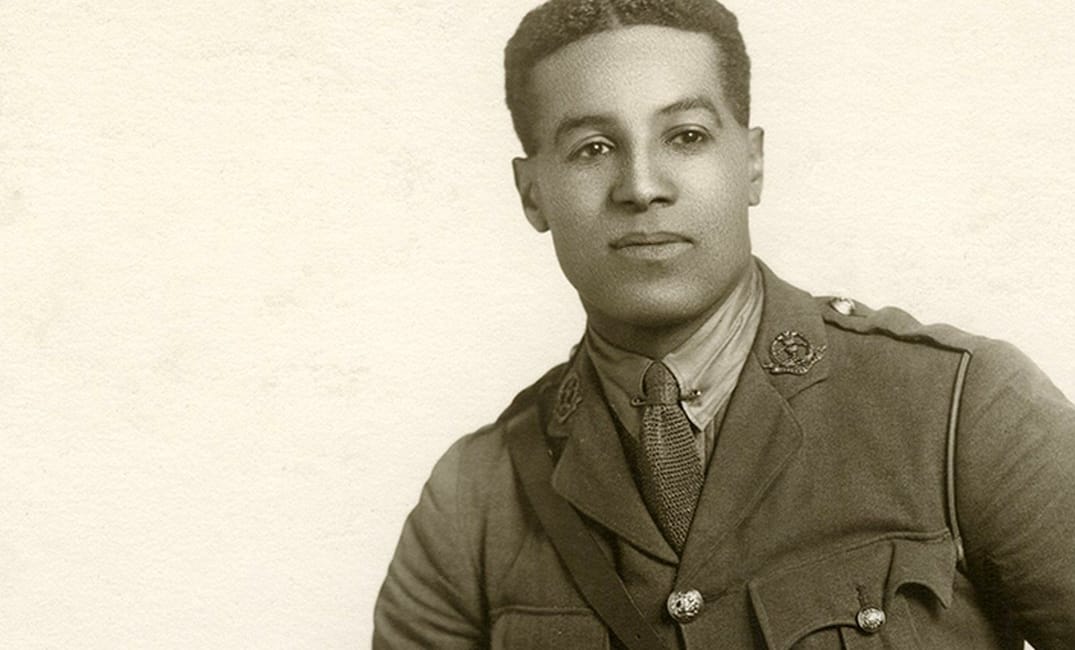✏️ Rachael Thacker
Your favourite footballer might be Marcus Rashford, Raheem Sterling or one of the other excellent black footballers that showcase their skills on the green stage. Yet, you probably won’t be aware of one of the first black English footballers who paved the way forward for the players you admire now.
Walter Tull was not only skillful on the pitch, but heroic in World War I as he became the first black Officer ever in the British army.
Phil Vasili and David Thacker are two people who know the life of Walter Tull very well, having worked together to produce a play about his journey and triumphs. I sat down for a conversation with them in order to learn about why Walter Tull’s story should be shared with others.
Football
“Most intelligent player on the pitch”. It was clear that Walter was an outstanding footballer fortunate enough to be selected by Spurs. Still he had to be better to achieve the same level of respect from teammates and spectators.
Following a match at Bristol where Walter faced horrendous racist chants, Tottenham managers decided it was in their best interest to bench Walter, fearing racist negativity might impact the performance of the team.
Here’s one of the quotes from a journalist following the Bristol match; “Let me tell those Bristol hooligans that Tull is so clean in mind and method as to be a model for all white men who play football…In point of ability, if not actual achievement, Tull was the best forward on the field.”
Back then clubs didn’t know how to deal with institutional racism in the game and I question if they do now. As we still witness ‘monkey’ chants and racist insults going consequence-free.
In our discussion, Phil addressed how for him the pulling down of the Colston statue felt like a symbolic apology from Bristol to Walter for the abuse which he received there.
Walter was soon transferred to Northampton Town under the progressive manager Herbet Champman. He preferred playing there yet never reached his full potential. This is a reality I fear too many black individuals experience across industries.
World War I
Soldiers in World War I were untrained and still with a civilian mentality, so natural leaders arose under the terrifying circumstances. Walter joined a football platoon, meaning he was already relatively well known, not having to reprove himself.
Although Walter led many men to safety during night raids and was an exceptional leader, Phil wanted to clarify the message that he was a “reluctant hero”, who “hated war”. Still, he was promoted, becoming the first ever black Officer. Breaking the regulations that a black man couldn’t take charge over a white man.
Despite Walter being sent home, after suffering from what we now would describe as PTSD, he returned to Northern France in 1918. He died in action on the 25th of March 1918, his body was never recovered.
Phil has campaigned for over 20 years for Walter to be awarded the military cross. This bid is still unsuccessful, with the Ministry of Defence being seemingly reluctant to address the institutional racism within the army, which prevented the initial awarding. On the other hand, the refusal to acknowledge Walter’s efforts clearly shows the racism which still staurates the armed forces.
Family
Unusually for a black working class boy, Walter’s life was relatively well documented in public archives. Nonetheless, Phil’s most important research was conducted through contact with Walter’s Family. Orphaned at the age of 9, it made his relationship with his siblings much stronger.
Their father Daniel was born in Barbados. As an effort to learn more about Tull’s heritage, Phil visited Barbados where Walter’s father was brought up. He described how the attitude of the people there was one of “tenacity” and “stoicism”, seeing how these characteristics were passed down to Walter.
The Play
Phil and David originally started collaborating on a film to showcase Walter’s life. Nonetheless, after high hopes and false expectations they failed to secure the funding. “Look at the stories which aren’t made”; that’s where you learn a lot about the industry, these “cultural gatekeepers” deciding whose stories are worthy of the world knowing.
They felt ahead of the game, seeing the significance of Walter’s triumphs which others couldn’t. Finally, in 2013 they performed the play Tull at the Octagon Theatre, Bolton. Casting Nathan Ives-Moiba to reenact Walter’s journey in overcoming adversity. “It really is a play which certainly should be done again.”
“Why should Walter’s life become more well known?”
Walter Tull was an inspiring character, who I’m sure many black people can resonate with. Having to work twice as hard to earn the same level as respect as their white peers.
Walter was successful in proving himself to his teammates and fellow soldiers, it’s a shame that this same level of acknowledgement hasn’t been addressed in the history we are taught.
“Young people always have a fresh insight. Children seem to have a great sense of what’s just and unjust. They immediately connect with Walter’s story”
In response to the same question David answered; “Well I’d have to start with George Floyd, black lives matter. There has been a world phenomena. Therefore we need black heroes. We need stories and narratives about black heroes, and he is iconic in so many ways.”
“Show us what the worlds like that we live in. To show us the good and the bad. What things are impacting on us…There could never be a better time to do this than now”.
Thanks for reading our article! We know young people’s opinions matter and really appreciate everyone who reads us.
Give us a follow on Instagram, Twitter and Facebook to stay up to date with what young people think.

